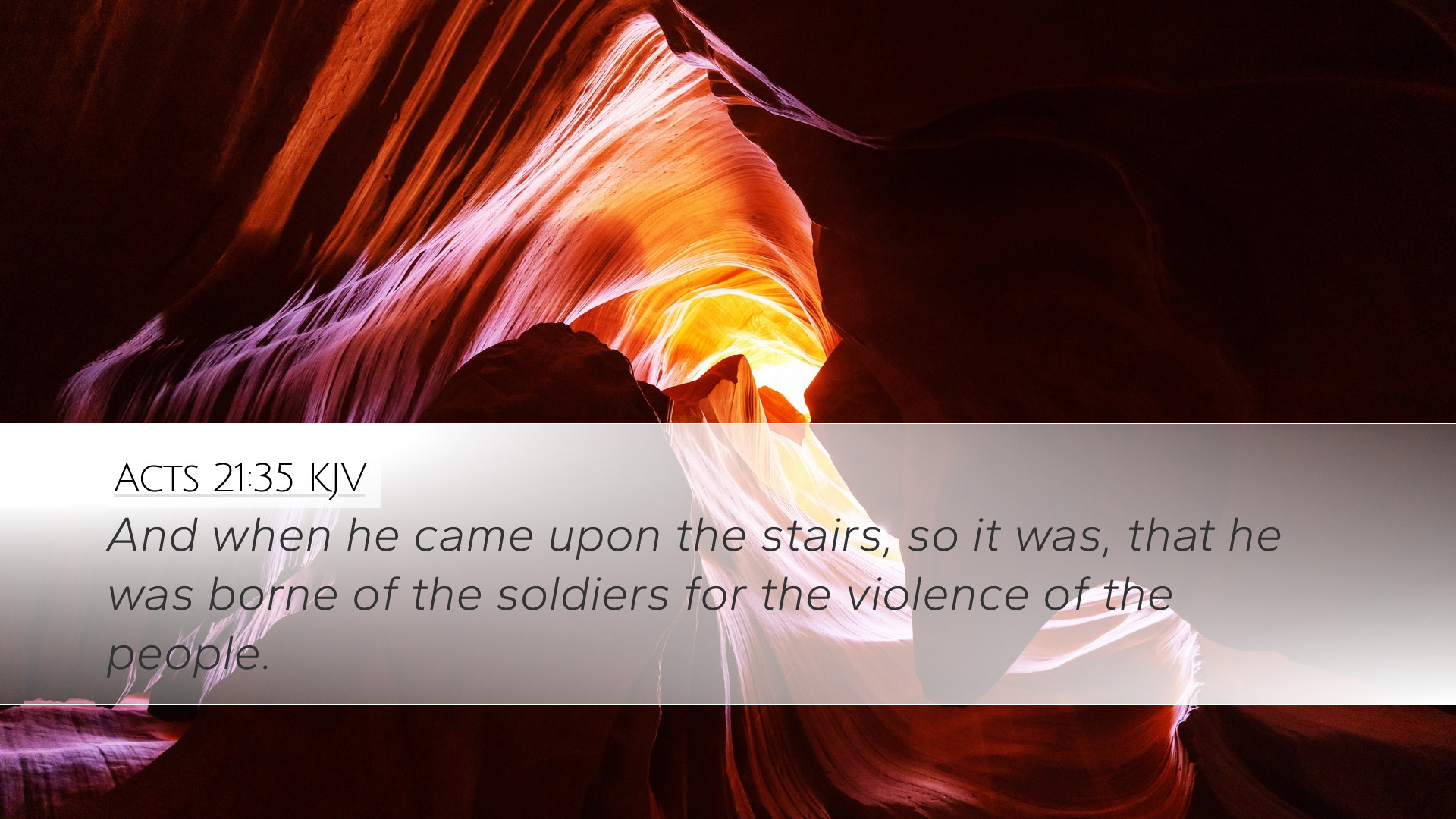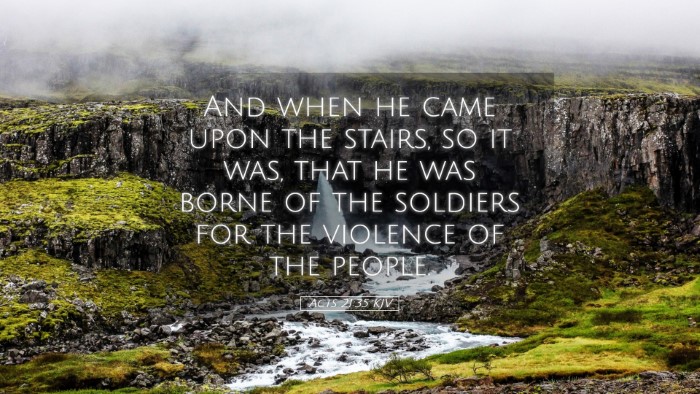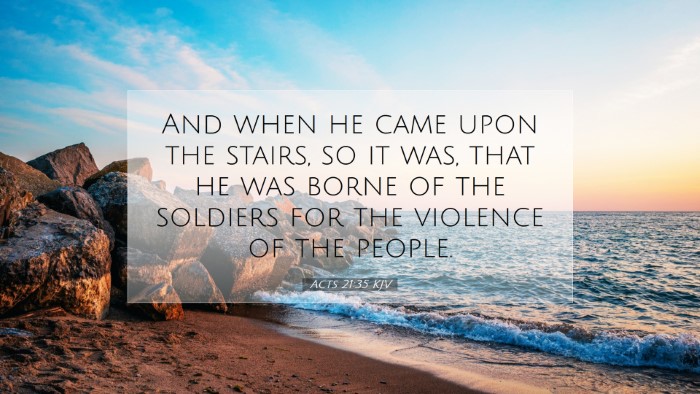Bible Commentary on Acts 21:35
Verse: "And when he came upon the stairs, so it was, that he was borne of the soldiers for the violence of the people."
Introduction
This verse marks a pivotal moment in the account of Paul’s journey and subsequent arrest. It sets the scene for the intense conflict between the early Christians and the Jewish authorities, displaying the political tensions that permeated the early church's expansion. Understanding the context and implications of Acts 21:35 is crucial for appreciating the early Christian experience and the unfolding of their mission amidst opposition.
Contextual Analysis
In the broader narrative of Acts 21, we find Paul actively involved in ministry but facing increasing hostility, particularly from Jewish leaders. His return to Jerusalem culminates in accusations that he was teaching against the law and bringing Gentiles into the temple – an act considered blasphemous by many Jews.
Matthew Henry's Commentary
Matthew Henry emphasizes the peril that Paul faced and the divine providence in his rescue. He notes that the soldiers bore Paul up the stairs amidst the hostility of the crowd. This physical separation indicates not only the seriousness of the threat against Paul but also an act of divine intervention through Roman authorities.
- Divine Protection: The soldiers’ involvement signifies God's safeguarding of Paul. Henry indicates that when believers are in peril for righteousness, God often uses unlikely means for their protection.
- Public Outcry: The "violence of the people" reveals societal tensions; Henry notes how mob mentality can escalate quickly when spiritual beliefs are threatened, particularly with the fervency seen in first-century Jerusalem.
Albert Barnes's Commentary
Albert Barnes provides a rich historical context for understanding the political dynamics at play in this passage. He highlights the role of Roman soldiers in maintaining order during civil unrest, especially in a volatile city like Jerusalem.
- Social Dynamics: Barnes interprets the soldiers' actions as both a protective measure for Paul and a testament to the Roman response to civil disorder. This illustrates the intersection of faith and law, where civil authorities had a role in religious disputes.
- Physical Condition: The phrase "borne of the soldiers" reflects not only a physical elevation but symbolizes the elevation of Paul’s position as a Roman citizen, which provides him a measure of rights not afforded to others.
Adam Clarke's Commentary
Adam Clarke delves into the metaphoric implications found within the passage. His commentary is particularly focused on the broader testament of suffering that characterizes Paul’s ministry.
- Suffering for Christ: Clarke draws from the entirety of Paul’s journeys, interpreting this moment as a microcosm of the larger narrative of Christian suffering and perseverance. Clarke highlights that such moments of physical danger underscore the spiritual mission at stake.
- Lessons for Believers: He emphasizes the takeaway for believers is the strength derived from faith during upheaval - a recurring theme seen in Paul’s life, reminding readers that overcoming trials is intrinsic to the Christian experience.
Theological Implications
The significance of Acts 21:35 extends into numerous theological discussions.
- God’s Sovereignty: The protection Paul received demonstrates God’s overarching control and plan, even within chaotic circumstances.
- Role of Authorities: The passage prompts discussions on the relationship between the church and state, particularly regarding the rights of believers against societal opposition.
- Public Perception of Faith: Observing how society reacts to a fervent faith can guide contemporary understanding of how churches interact with prevailing cultural norms.
Reflection and Application
Pastors, students, theologians, and scholars can draw from Acts 21:35 practical wisdom for navigating similar dynamics today. In facing external pressures, believers are encouraged to rely on God's providence and to approach situations with the same composure exhibited by Paul.
Considerations include:
- Maintaining Composure: Reflect on how Paul’s calm acceptance of the situation can model behavior in today's turbulent climate.
- Unity in Faith: The violent uproar illustrates the necessity for unity within the church to withstand external opposition.
- Engagement versus Isolation: As Paul engaged with the Jewish community, understanding opposition can serve as a means of interaction with non-believers rather than retreat into isolation.
Conclusion
Acts 21:35 represents a layered moment in the scripture, rich with historical, theological, and practical implications. Through insights from Matthew Henry, Albert Barnes, and Adam Clarke, we glean a fuller understanding of Paul’s experience and the ongoing relevance of this narrative for believers today. Each commentator offers a unique lens through which we can better understand the call to endure amidst strife, relying on God’s protection and the proper engagement with our surrounding culture.


